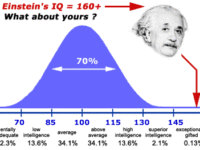Monday, October 21, 2019 0:09
https://coyoteprime-runningcauseicantfly.blogspot.com/2019/10/the-battle-of-brain.html

This essay is adapted from psychiatrist Iain McGilchrist’s book “The Master and his Emissary: the Divided Brain and the Making of the Western World,” published by Yale University Press.
by Iain McGilchrist
“Why is the brain divided? If it is about making connections, why has evolution so carefully preserved the segregation of its hemispheres? Almost every function once thought to be the province of one or other hemisphere – language, imagery, reason, emotion – is served by both hemispheres, not one. There is nonetheless a highly significant difference in how the two hemispheres work, giving rise to two wholly distinct takes on the world. Normally we synthesize them without being aware that we are doing so. But one of the two hemispheres can come to dominate – and just as this may happen for individuals, it may also happen for a whole culture.
The neuropsychological evidence shows that the right hemisphere pays wide-open attention to the world, seeing the whole, whereas the left hemisphere is adept at focusing on a detail. New experience, whatever its kind, is better apprehended by the right hemisphere, whereas the predictable is better dealt with by the left. And because the right hemisphere sees things in context, as inseparably interconnected, it recognizes the vast extent of what remains implicit. By contrast, because of its narrow focus, the left hemisphere isolates what it sees, and is relatively blind to things that can be conveyed only indirectly.
In humans, the left hemisphere controls the grasping right hand and the bits of language that enable us to pin down meaning unambiguously. It helps us manipulate and use the world, in pursuit of our aims. The left hemisphere’s world is sharply delineated and certain, along the lines of the general’s strategy map on the command room wall, where the complexity of the world is stripped away. Yet we still need to see the essentially human world as it is before we simplify and disconnect it. A general needs to be in touch with the world in which his soldiers actually fight. The knowledge that is mediated by the left hemisphere is knowledge within a closed system. It has the advantage of perfection, but such perfection is bought ultimately at the price of emptiness.
The right hemisphere’s take on the world is far more complex and nuanced. Instead of distinct mechanisms, the right hemisphere sees interconnected, living, embodied entities. In communication the right hemisphere recognizes all that is nonverbal, metaphorical, ironic or humorous, where the left is literalistic. The right is at ease with ambiguity and the idea that opposites may be compatible.
There is a reason we have two hemispheres: We need both versions of the world. Without the right hemisphere, we are socially and emotionally insensitive, and have an impaired understanding of beauty, art and religion. Effectively autistic, we have no sense of the broader context of experience. Meanwhile, without the left hemisphere, we struggle to bring detail into focus. If a culture were ever to rely excessively on one take alone, there would sooner or later need to be a correction.
Yet in the West there has been such an imbalance. And as a consequence, over the past 2,500 years, there has been a kind of battle going on in our brains, the result of which has been, despite swings of the pendulum, an ever greater reliance on the left hemisphere.
The peculiar strengths of the West emerged in ancient Greece and reflect what can be achieved when each hemisphere develops relatively independently, but in harmony. In art, there was a startling development of empathy in the representation of the human face, with even the direction of gaze shifting towards the left, favoring the right hemisphere. The great outpouring of tragic drama, the emergence of irony and poetry rich in metaphor all suggest a new prominence of the right hemisphere view. Similarly, empiricism, the right hemisphere’s approach to the world, flourished in science: The philosopher Thales was able to predict correctly an eclipse of the sun. At the same time, the formalization of many systematic bodies of knowledge and the emergence of analytic philosophy suggest an advance in the theoretical, which the left hemisphere can yield.
While the hemisphere balance was initially preserved, a struggle was brewing. With time the partnership was lost, and peculiar weaknesses begin to show. The left hemisphere – relatively rigid, rule-bound and abstract in its view – begins to take precedence. With Parmenides, and still more with Plato, philosophy shifted from a respect for the hidden and implicit to an emphasis on what can be made explicit alone. The previously acknowledged idea that opposites can agree became anathema.
In the Roman world, too, the hemisphere views were reconciled at first. But the balance achieved in the Augustan era, which corresponded with a burgeoning of the arts, the codification of jurisprudence and the rise of ideals of reasonableness and moral rectitude, gave way to ever more rigidly systematized ways of thinking, increasing bureaucracy and, ultimately, a decline in the representation of the human figure and face. The imperial vastness of late Roman architecture was made possible by the invention of concrete. The weight of rigid codification which served the left hemisphere’s way to power drove out the subtler sense of part to whole which informed architecture of the Classical era.
A whole millennium later, the flowering of the Renaissance again manifested this enhanced distinctness, yet cooperation, of the hemispheres. It did so equally in science and the arts. There was an openness to things as they are, not in theory, a respect such as one sees, for example, in Montaigne, for our embodied nature, a delight in the coincidence of opposites. There was a vast enlargement of context, with the opening of deep perspectives in both time and space, which situate the individual in relationship to the world at large: One sees it in the poetry of Villon as much as in the paintings of Ghirlandaio. A rise in harmony and counterpoint in music expressed the importance of the relationship between part and whole. In Shakespeare, unique individuals repudiate the stereotypes demanded by the structure of the play: Shylock commands our sympathy, Barnardine refuses to be hanged. Individuals trump the category. Exuberant metaphor takes language far beyond the explicit. Even the combination of humor and pathos which characterized the period suggests a take on the world that was mediated by the right hemisphere.
But with the Reformation, and with the beginnings of the Enlightenment, there again saw a shift in mentality towards what is certain, rigid, fixed and simplified. The left hemisphere was fighting back, pushing for a renewed emphasis on symmetry and stasis. Ambiguity was no longer a sign of richness, but of obscurity. Imagination was mistrusted and metaphor became a lie. Rationalism came to replace the humane balance implied in reason. As Descartes said, things can be seen clearly only if they are seen singly, one by one. The world was atomized. And with these developments came a rise in the mechanical model as the only framework for understanding ourselves and the world.
This led to our own age, to a world where the right hemisphere, with its broader view, has been systematically discounted. Like the brain itself, the battle I describe is asymmetrical. Each swing of the pendulum has carried us further into the territory of the left hemisphere’s world.
The two hemispheres also differ in their attitude to their differences. The right hemisphere is inclusive in its attitude to what the left hemisphere might know, but the left hemisphere is exclusive of the right. Where the right hemisphere’s world responds to negative feedback, the left hemisphere gets locked ever further into its own point of view. Its capacities are limited to doing the same things it has always done, and no more. And so our world has become increasingly rule-bound. Loss of the implicit damages our ability to convey, or even to see at all, aspects of ourselves and our world that transcend the mechanistic. Perspective in art has receded along with harmony in music: we tend more and more to see the world as a heap of intrinsically meaningless fragments.
There is an inevitable rise in bureaucracy, with paper replacing people, and experience increasingly virtualized. In going all out for what we believe will be our own happiness, we exploit the world and see ourselves as alien to it, rather than seeing that our happiness depends on being part of it, and therefore on helping it to thrive. This is the world of the left hemisphere, ever keen on control.
Yet the pursuit of self-interest has not left us happier. Over the last 35 years, a period during which there has been an enormous increase in prosperity, levels of satisfaction with life have declined in the U.S. Since those blessed with employment spend much of their life at work, the quality of that experience matters. In 1955 in the U.S., 44% of all workers enjoyed their working hours more than anything else they did; by 1999 only 16% did, according to Gallup poll data. What makes us happy is not wealth but the reciprocal relationship between ourselves and one another, ourselves and the world. This is something the right hemisphere alone understands, since it is the ground of empathy and interconnectedness, where the left hemisphere is concerned with manipulation and sees the world atomistically.
The left hemisphere has evolved to help us use the world to achieve our ends. But it is a specialist in denial. After a right hemisphere stroke, subjects will often flatly deny that anything is wrong, even when attention is drawn to the fact that half of their body may lie there useless. Or they may say it belongs to someone else, the guy in the next bed. The left hemisphere, ever optimistic, is like a sleepwalker whistling a happy tune as it ambles towards the abyss. Let’s wake up before we free-fall into the void.”





